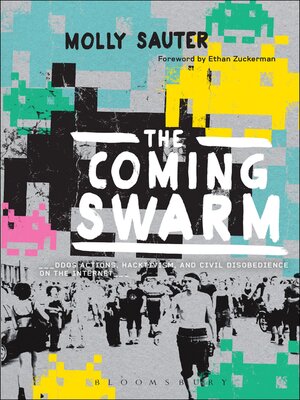The Coming Swarm
ebook ∣ DDOS Actions, Hacktivism, and Civil Disobedience on the Internet
By Molly Sauter

Sign up to save your library
With an OverDrive account, you can save your favorite libraries for at-a-glance information about availability. Find out more about OverDrive accounts.
Find this title in Libby, the library reading app by OverDrive.



Search for a digital library with this title
Title found at these libraries:
| Library Name | Distance |
|---|---|
| Loading... |
This book is available as open access through the Bloomsbury Open Access programme and is available on www.bloomsburycollections.com.
What is Hacktivism?
In The Coming Swarm, rising star Molly Sauter examines the history, development, theory, and practice of distributed denial of service actions as a tactic of political activism. The internet is a vital arena of communication, self expression, and interpersonal organizing. When there is a message to convey, words to get out, or people to unify, many will turn to the internet as a theater for that activity. As familiar and widely accepted activist tools-petitions, fundraisers, mass letter-writing, call-in campaigns and others-find equivalent practices in the online space, is there also room for the tactics of disruption and civil disobedience that are equally familiar from the realm of street marches, occupations, and sit-ins? With a historically grounded analysis, and a focus on early deployments of activist DDOS as well as modern instances to trace its development over time, The Coming Swarm uses activist DDOS actions as the foundation of a larger analysis of the practice of disruptive civil disobedience on the internet.
What is Hacktivism?
In The Coming Swarm, rising star Molly Sauter examines the history, development, theory, and practice of distributed denial of service actions as a tactic of political activism. The internet is a vital arena of communication, self expression, and interpersonal organizing. When there is a message to convey, words to get out, or people to unify, many will turn to the internet as a theater for that activity. As familiar and widely accepted activist tools-petitions, fundraisers, mass letter-writing, call-in campaigns and others-find equivalent practices in the online space, is there also room for the tactics of disruption and civil disobedience that are equally familiar from the realm of street marches, occupations, and sit-ins? With a historically grounded analysis, and a focus on early deployments of activist DDOS as well as modern instances to trace its development over time, The Coming Swarm uses activist DDOS actions as the foundation of a larger analysis of the practice of disruptive civil disobedience on the internet.







